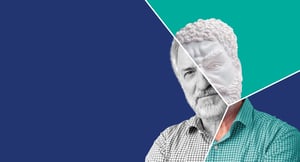Given the relevance of aging in Swiss society — with the Ticino Region having the highest longevity in Europe – the Forum aimed to promote awareness about aging in both the scientific community and the population. The Forum entitled “New Frontiers in the biological and environmental determinants of aging” brought together international experts from various disciplines (Biology, Psychology and Epidemiology) to discuss aging from their perspectives.
The first part of the Forum was focused on the biology of aging and age-related disorders. The experts presented the latest findings in the molecular, cellular, and organismal basis of aging, offering an opportunity to learn and discuss novel concepts and current challenges.
The second part of the Forum dealt with the critical role of social connections, culture and the arts in shaping our happiness, health and longevity, merging epidemiological and scientific data with psychological aspects. Studies showing how culture and the arts increase people's life expectancy were also presented.
The Forum emphasized the need for interdisciplinary collaboration between healthcare practitioners, researchers and experts from other fields to establish aging-longevity medicine as a strong clinical and academic specialty. By working together, professionals from various disciplines can bring their unique perspectives and expertise to the table, leading to better approaches and solutions to aging-related issues.
The event was organized by IBSA Foundation and the Bellinzona Institutes of Science (Bios⁺).
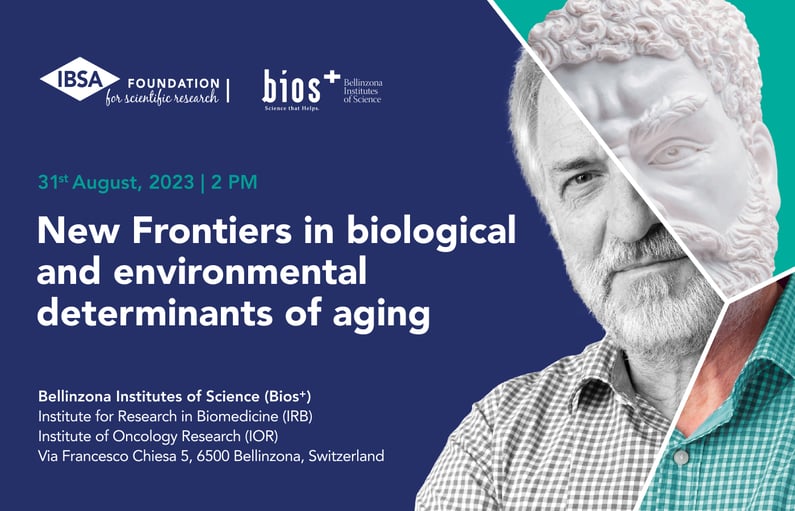
Programme
- 14:00 Institutional Greetings
- 14:30 Hallmarks of Aging: focus on autophagy
Prof. Guido Kroemer (France) - 15:15 Stem cell aging and rejuvenation: An epigenetic journey
Prof. Thomas Rando (USA) - 16:00 Coffee Break
- 16:30 Does emotional wellbeing influence health and longevity?
Prof. Andrew Steptoe (UK) - 17:15 Q&A
- Networking
Moderators
Andrea Alimonti - Professor of Experimental Oncology at ETH Zürich and at Università della Svizzera Italiana, ERC Investigator, EMBO YIP, Head Molecular Oncology Institute of Oncology Research and member of Scientific Board of IBSA Foundation for scientific research (Switzerland)
Introduction of Prof. Andrew Steptoe
Luigi Di Corato - Director of Cultural Affairs of the City of Lugano (Switzerland)
Abstract
- Hallmarks of Aging: focus on autophagy
Prof. Guido Kroemer (France)
Three criteria that must be met for each hallmark of aging: (1) the time-dependent, manifestation of alterations accompanying the aging process, (2) the possibility to accelerate aging by experimentally accentuating the hallmark, and—most decisively—(3) the opportunity to decelerate, halt or reverse aging by therapeutic interventions on the hallmark. During recent years we and others have accumulated data indicating that disabled autophagy fulfills these criteria in thus far that (i) autophagy progressively declines with age in model organisms, (ii) genetic or pharmacological inhibition of autophagy accelerates aging, as well as the manifestation of age-related diseases including cancer, cardiovascular and degenerative diseases, and (iii) experimental autophagy enhancement extends healthspan and lifespan. - Stem cell aging and rejuvenation: An epigenetic journey
Prof. Thomas Rando (USA)
Stem cells exhibit age-related declines in functionality, leading to impairments of tissue homeostasis and repair. Those changes are a result of both intrinsic mechanisms (e.g., genomic instability, impaired proteostasis, etc.), as well as extrinsic influences from their niche and their system environment. As such, intracellular and extracellular stresses can accelerate the rate of decline in stem cell function. However, it has become increasingly clear in recent years that aging phenotypes can be reversed, at least partially and temporarily, by interventions that restore a more youthful epigenome in stem cells throughout the body. Explorations of various interventions (e.g., dietary, pharmacologic, parabioitic, exercise, etc.) have revealed mechanisms of epigenetic rejuvenation that have the potential to translate into therapies to extend healthspan in humans by enhancing tissue homeostasis and regeneration. - Does emotional wellbeing influence health and longevity?
Prof. Andrew Steptoe (UK)
The links between emotional processes and physical health are becoming better understood through a combination of large-scale epidemiological research and more focused mechanistic studies of underlying biology. Epidemiological research in which older people are tracked over time has shown that greater positive emotional well-being is associated with longer survival, even when sociodemographic factors and existing health problems are taken into account. Relationships have been observed both for hedonic aspects of well-being (happiness, enjoyment) and eudemonic well-being (meaning and purpose in life). Positive well-being is also linked with reduced incidence of major age-related conditions and with healthier ageing. Mechanistic studies have found that greater well-being is associated with lower systemic inflammation, reduced levels of cortisol, and with diminished stress-related biological activation. A better understanding of these processes will promote a more integrated perspective on ageing, and help to find ways that enhance the health and morale of older people.
Speakers
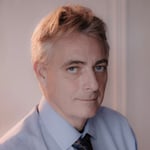
Prof. Guido Kroemer (France)
Professor at the Faculty of Medicine of the University of Paris Cité, Director of the research team "Metabolism, Cancer and Immunity" of the French Medical Research Council
Guido Kroemer is currently Professor at the Faculty of Medicine of the University of Paris-Cité, Director of the research team "Metabolism, Cancer and Immunity" of the French Medical Research Council (INSERM), Director of the Metabolomics and Cell Biology platforms of the Gustave Roussy Comprehensive Cancer Center, and Hospital Practitioner at the Hôpital Européen Georges Pompidou, Paris, France. Dr. Kroemer’s work focuses on the pathophysiological implications of cell stress and death in the context of aging, cancer and inflammation. He discovered the ignition of regulated cell death pathways by mitochondrial membrane permeabilization, the cytoprotective and antiaging effects of macroautophagy, as well as the decisive role of immunogenic cell death in anticancer treatments. With over 1500 articles including 63 papers in the ‘CNS’ Journals Cell (13 papers), Nature (5), Nature Medicine (21), Science (18) and Science Translational Medicine (6) and an h-index of 275, he is the European Union’s most cited researcher in biomedical research and the worldwide most cited researcher in Biology and Biochemistry (https://research.com/scientists-rankings/biology-and-biochemistry). His contributions have been recognized with multiple awards including the most prestigious cancer research prizes from Belgium (Baillet-Latour Health Prize), France (Prix Duquesne, Prix Léopold Griffuel, Grand Prix Ruban Rose) and Switzerland (Brupbacher Prize), the European Union-sponsored Descartes Prize, as well as the most important Italian science prize (Lombardia & Ricerca Prize). Kroemer is the founding Editor-in-Chief of five journals: Cell Death & Disease, Cell Stress, OncoImmunology, Microbial Cell, and Molecular & Cellular Oncology. He is member of the Academia Europaea, Austrian Academy of Sciences, Chinese Academy of Engineering, European Academy of Cancer Sciences (EACS), European Academy of Sciences (EAS), European Academy of Sciences and Arts (EASA), European Molecular Biology Organization (EMBO), German Academy of Sciences (Leopoldina), Institut Universitaire de France (IUF) and Royal Spanish Academy of Sciences. He is the Founding President of the European Academy of Tumor Immunology (EATI).
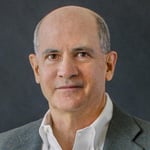
Prof. Thomas Rando (USA)
Director of the Broad Stem Cell Research Center, Professor of Neurology and of Molecular, Cell, and Developmental Biology at UCLA and Professor at Stanford University
Dr. Rando is the Director of the Broad Stem Cell Research Center at UCLA where he is a professor of Neurology and Molecular, Cell, and Developmental Biology. His lab has been a leader in both stem cell biology and the biology of aging, having pioneered the use of heterochronic parabiosis in the study of molecular, cellular, and organismal aging. He has published over 200 peer reviewed articles and he is an elected member of the National Academy of Medicine and the American Academy of Arts and Sciences. Dr. Rando is also a scientific founder and Chairman of the Board of Fountain Therapeutics, a platform company based on the understanding of cellular aging for drug discovery for the treatment of chronic-age related diseases.
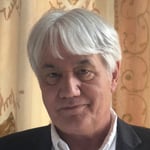
Prof. Andrew Steptoe (UK)
Head, Department of Behavioural Science and Health Institute of Epidemiology and Health Care - University College London
Andrew Steptoe is professor of psychology and epidemiology at University College London, where he is Head of the Department of Behavioural Science and Health, and director of the English Longitudinal Study of Ageing (ELSA). He graduated in Natural Sciences from Cambridge University and completed his doctorate at the University of Oxford. He was head of the Department of Psychology at St. George’s Hospital Medical School in London before moving to University College London in 2000. He was British Heart Foundation Professor of Psychology from 2000 until 2016, and Director of the Institute of Epidemiology and Health Care from 2011 until 2017. He is a Fellow of the British Academy, the Academy of Medical Sciences, the Royal Society of Biology, and the Academy for Social Sciences. Dr Steptoe’s research is primarily focused on links between psychological and social processes and physical health, and on population ageing. He is author or editor of 24 books and around 980 journal articles and chapters.
Interviews
Guido Kroemer
Thomas Rando
Andrew Steptoe
Silvia Misiti
Andrea Alimonti
Photos
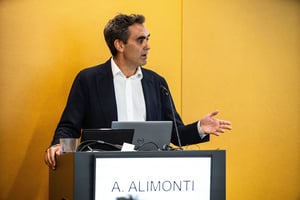
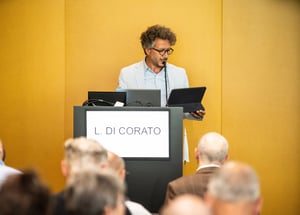
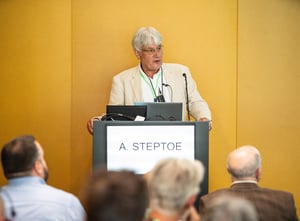
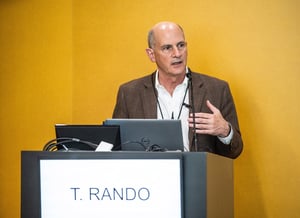
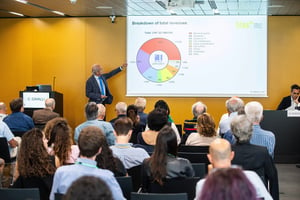
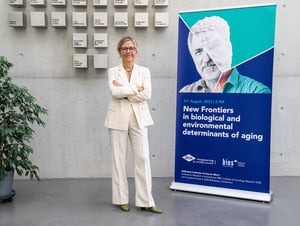
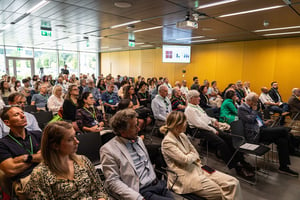
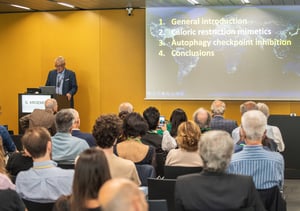
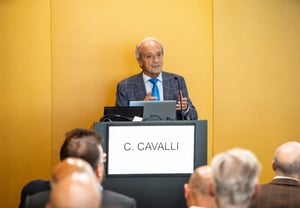
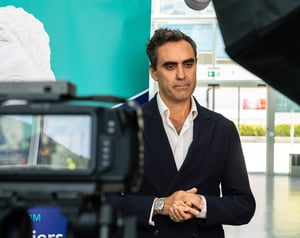
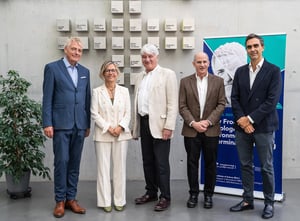
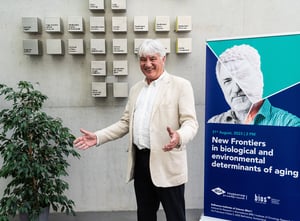
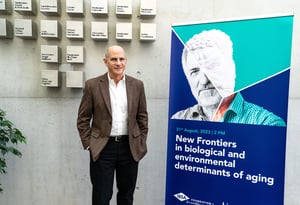
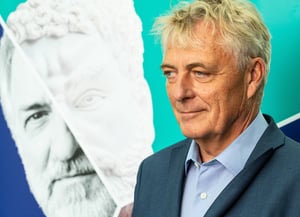
Full video
